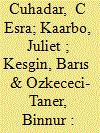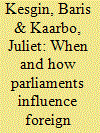|
|
|
Sort Order |
|
|
|
Items / Page
|
|
|
|
|
|
|
| Srl | Item |
| 1 |
ID:
120752


|
|
|
|
|
| Publication |
2013.
|
| Summary/Abstract |
Leaders are influential in Turkish politics; since early Republican years under Atatürk and Inönü, the dominance of omnipotent leaders continued, if not escalated, under democratic elections. Menderes or Demirel or Erbakan, and presently Erdogan, each leader assumed office with different personal and political backgrounds, worldviews, and personality characteristics. Nonetheless, a systematic study of political leaders in Turkish politics and foreign policy has rarely been a concern to scholars of Turkey. This lack of attention to Turkey's political leaders affects not only a nuanced understanding of its domestic politics but also its foreign policy. How do Turkish leaders' idiosyncratic traits affect their politics? How does the common phrase "secular and religious leaders" capture differences among Turkey's leadership? Utilizing a method of leadership assessment at-a-distance, this piece provides answers to such questions with respect to foreign policy profiles of all post-Cold War prime ministers of Turkey. It illustrates that Turkish leaders have distinct leadership traits but cannot be reduced to "seculars" and "Islamists."
|
|
|
|
|
|
|
|
|
|
|
|
|
|
|
|
| 2 |
ID:
178597


|
|
|
|
|
| Summary/Abstract |
Using both quantitative and qualitative research techniques, we investigate the effect of leaders’ style and personality on foreign policy. The study examines six Turkish leaders, Süleyman Demirel, Bülent Ecevit, Necmettin Erbakan, Recep Tayyip Erdoğan, Abdullah Gül, and Turgut Özal, and 18 foreign policy cases to answer the following questions: do Turkish leaders differ from each other in terms of their personality traits and styles?; how did their styles affect their foreign policy choices?; and how did they react to various domestic and international constraints they encountered in cases of foreign policy? Our findings suggest that: (a) in terms of their personality traits, Turkish leaders do not collectively fit in one category; (b) there are some stark differences among our six leaders, although some leaders are more similar to each other than others in terms of their personality traits and styles; (c) these differences were observable in the foreign policy decisions they made.
|
|
|
|
|
|
|
|
|
|
|
|
|
|
|
|
| 3 |
ID:
095639


|
|
|
|
|
| Publication |
2010.
|
| Summary/Abstract |
Turkey's decision on its role in the Iraq war in 2003 illustrates the power-and limits-of parliaments as actors in foreign policy. Traditionally, assemblies are not seen as important players in the foreign policies of parliamentary democracies. Instead, cabinets are generally considered the chief policymaking authorities. If the government enjoys a parliamentary majority, legislatures typically support the cabinet, if they are brought into the process at all. The March 1, 2003 vote by the Turkish parliament to not allow the United States to use Turkey as a base for the Iraq invasion challenges this conventional wisdom on parliamentary influence (in addition to many interest-based explanations of foreign policy). This paper examines this decision in the context of the role of parliaments in foreign policies and explores the relationships between parliamentary influence, leadership, intraparty politics, and public opinion
|
|
|
|
|
|
|
|
|
|
|
|
|
|
|
|
|
|
|
|
|